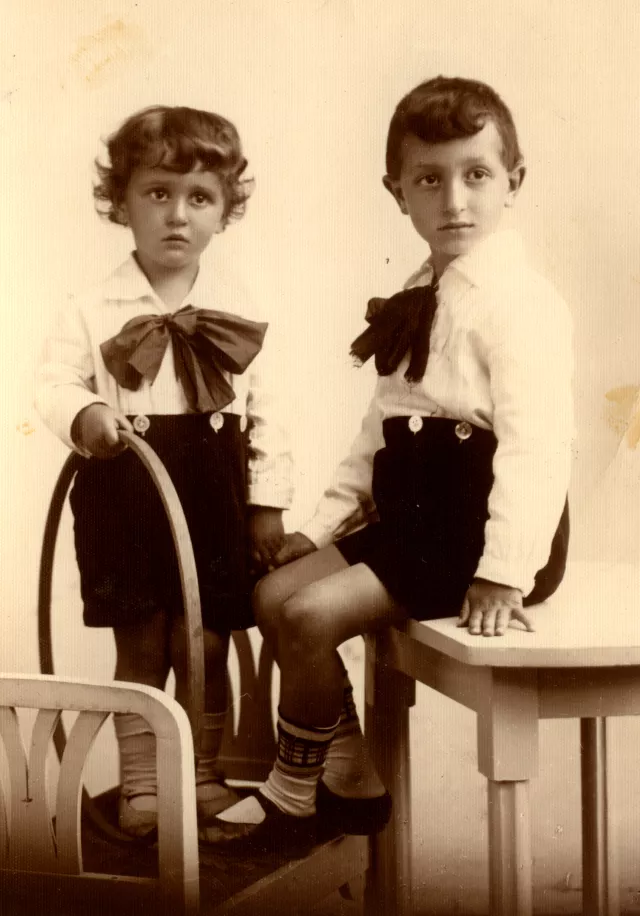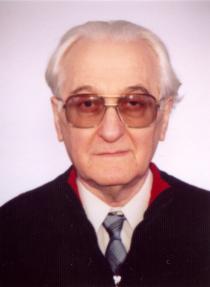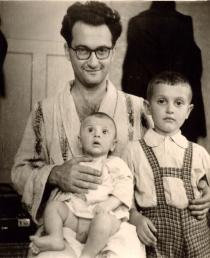This is me with my brother Mihl-Duvid. Mazeikiai, 1928.
Ìy parents got married in Mazeikiai. I do not know if their wedding was Jewish as both of them, especially father, were unreligious. They might be married under chuppah out of mere respect for the relatives in order to observe the tradition. In 1923 my elder brother was born. He had a double name Mikhl-Duvid. He was named Duvid after grandfather, but I do not know the reason for his second name Mikhl. At home brother was called Duvid. I was born on the 17th of November 1925. I was named Isroel after one of my great grandfather, I do not know paternal or maternal. The surname of my father and grandfather was Lempert. I was born in independent Lithuania, so a Lithuanian version of my Jewish name was written in my birth certificate, namely Lempertas I still carry that name.
Our family did not own any property and our parents always rented an apartment. I do not remember the peculiarities of our apartments. Usually these were 3-room apartments with a kitchen, without conveniences (there was an outhouse). Father was busy with his work and social activity and could not spend a lot of time with his children. Mother mostly took care of us. The air in our house, and conversations of our guests, mostly Yiddishists, affected our upbringing. Mother was a housewife, but she just ran the house, while others did all the chores. We always had a maid- a Lithuanian tacit and hard-working woman. As per order of my mother she cooked dinner, cleaned the apartment and did the laundry. My parents were not religious. They tried to observe Jewish traditions while grandmother, who lived with us, and grandfather Faivush, were alive. At least most kashrut rules were observed during cooking. There were separate dishes for milk and for meat in the house- from the set of china up to pots, pans and cutting boards. Meat was bought in a special Jewish store, where only kosher meat was on offer. One of the apartments where we stayed for a long time, belonged to the owners of the kosher store. There were three owners of the store - two brothers Glik and their widowed sister Mendelevich. Poultry was purchased in the store and taken to shochet. In my early childhood mother took me to shochet. I remembered his small house with a shed in the yard. There was always a line of Jewish ladies with cackling fowl. There was no pork in our house when grandmother was alive. On Friday she or mother lit Sabbath candles. That was it, there was no other preparation for Sabbath- no cooking of tasty things, baking challahs. There were no things in our house as compared to other Jews. On Sabbath father did not work. Jewish bank like other Jewish educations was closed on Saturday. Father kept late hours at his desk reading and writing and I think he was violating Sabbath traditions. We did not mark Jewish holidays.
Our family was middle class, it was not rich. Books, papers, father was subscribed for, were the priority in our house. Since childhood we used to read them. We had radio in the 1930s. It was rather rare and expensive back in that time. My brother and I were given a bike. There were few Jewish children who had a bike and it was a kind of luxury. In summer we went to dacha [summer house], which parents rented in a small Lithuanian hamlet. Mother made us take a stroll in the forest for a long time, but brother and I were homesick and wanted to see our friends. We felt tedious in a hamlet. The living wage of our family was pretty decent. The majority of Jews were much poorer. There were a lot of rich people among Jews. Usually these were businessmen, owners of the stores, Jewish doctors and lawyers. I do not remember their names. All I know that the stores in the downtown mostly belonged to the Jews.
Isroel Lempertas with his brother Mihl-Duvid
The Centropa Collection at USHMM
The Centropa archive has been acquired by the United States Holocaust Memorial Museum in Washington, DC.
USHMM will soon offer a Special Collections page for Centropa.
Academics please note: USHMM can provide you with original language word-for-word transcripts and high resolution photographs. All publications should be credited: "From the Centropa Collection at the United States Memorial Museum in Washington, DC". Please contact collection [at] centropa.org.















